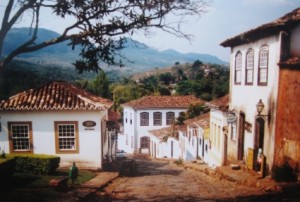
Photo © Michael Sommers.
The very first time I came to Salvador (close to 20 years ago), I was in town for only two weeks. One of the sensations I still remember was being overwhelmed by the fact that there were apparently so many unique “must-try” Bahian dishes to sample and so few time in which to try them all. To solve the problem, I was taken by Bahian friends to the Restaurante do SENAC, in the heart of the colonial district, the Pelourinho, where every day, an opulent lunch buffet featuring all the classic repertory of Bahia’s famed cuisine—from acarajés and abarás to bobó and moqueca – is served on the sweeping second floor of a centuries’ old house.
I remember not only being impressed by the food itself, but also by the service, which was carried out by a small legion of awkwardly formal yet extremely attentive young Bahians. Both the careful preparation and presentation of the food and the eager-to-please (and not screw up) demeanor of the wait staff was explained by the fact that cooks and servers alike are all student of local branch the SENAC Restaurant School and they were getting graded for their efforts.
Aside from Salvador’s SENAC restaurant—which is still in operation to this day – there are a dozen other restaurant-schools throughout the country. SENAC stands for Serviço Nacional de Aprendizagem Comercial (National Commercial Apprenticeship Service), is a private institution founded in 1946 in order to offer education and apprenticeship programs to Brazilians seeking professional careers in the service and tourism sectors. SENAC is particularly noted for its hotel and restaurant programs.Aside from Salvador’s SENAC restaurant—which is still in operation to this day – there are a dozen other restaurant-schools throughout the country, including in state capitals such as Rio de Janeiro, Belo Horizonte, Curitiba, Brasília, Recife, São Luís, and Manaus. Visiting these restaurants not only allows you to savor a smorgasbord of expertly prepared local and regional specialties as well as contemporary fare, but to do so without breaking the bank.
In addition, to the restaurant schools, SENAC also operated a quintet of hotel schools throughout the country where you can check in and be pampered by students learning the trade. With the exceptions of Campos de Jordão and Natal, the locations of these upscale hotels are not that compelling and their modern aspect and generic décor is bland (and not necessarily worth the less-than-budget rates).
However, a new and welcome exception on all fronts is SENAC first pousada-school, located in the colonial town of <a href=”pousada-school“>Tiradentes, in Minas Gerais (see photo). Open to guests since June, the cozy casa – with only six guest rooms – reflects the charm and warmth of Tiradentes itself, a former gold mining town whose perfectly preserved historical center and hilltops crowned with gleaming baroque churches, makes it one of the most charming colonial towns in Brazil.
Like the other SENAC hotel-schools, the pousada-school also has a restaurant school, although aside from daily breakfast, to date it only serves meals on the weekends (this is hardly a problem viewed the number and diversity of eating options in Tiradentes, which has earned a name for itself as a gastronomic mecca). For those interesting in checking out this pioneering project by checking into a room, rates for doubles start at R$290.